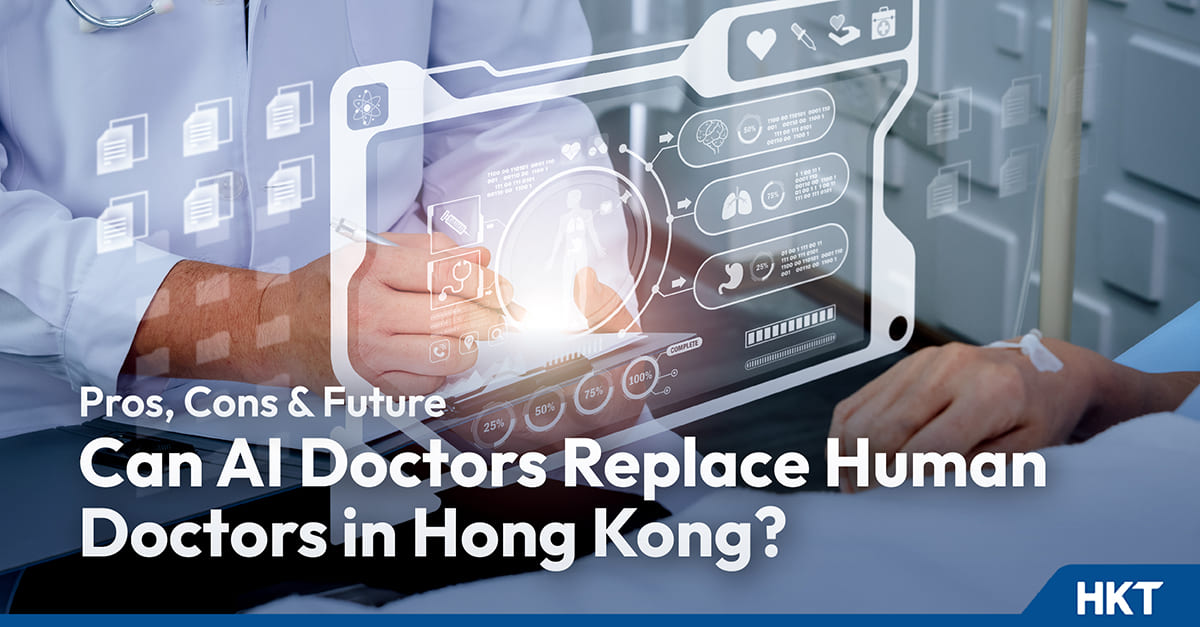AI & Robotics
Can AI Doctors Replace Human Doctors? The Pros, Cons, and Future in Hong Kong

Picture this: "You text your symptoms to an AI doctor and get an instant diagnosis—no calling Uber to the hospital, no 4-6 hours waiting rooms." AI doctors are turning this into reality, changing healthcare with virtual health assistants that analyse symptoms, suggest treatments, and even predict health risks. But can they really replace your trusted human doctors? In this blog, we dive into the pros, cons, and future of AI doctors in healthcare, with a spotlight on Hong Kong’s unique landscape.
Pros of AI Doctors
-
Get Answers Fast
-
AI doctors are on call 24/7, delivering instant responses to medical questions—no appointment is needed.
-
-
Smarter Diagnoses
-
Advanced AI can outshine human doctors in spotting tricky diseases.
-
“AI processes vast amounts of data in seconds, catching patterns human eyes might miss—especially in radiology and pathology.”— Dr. Wong, Clinical AI Researcher
-
-
Tailored Treatments
- By crunching medical data and patient histories, AI offers precise, evidence-based care plans.
- “AI reduces human error, ensuring personalized treatment decisions.”— Dr. Tan, Oncologist
-
Stay Ahead of Risks
-
AI predicts health issues and suggests proactive steps—perfect for managing chronic conditions.
-
-
Less Paperwork, More Care
- AI tackles scheduling and admin tasks, freeing doctors to focus on you.
Cons of AI Doctors
-
Pricey Tech
- Building and running AI doctors demands big bucks—think cloud computing and expert teams.
-
Messy Data
- Scattered patient records and messy formats (like handwritten notes) trip up AI’s accuracy.
-
Privacy Headaches
- Strict laws like GDPR make AI tricky to roll out without risking legal trouble.
-
Misdiagnosis Risks
- Lean too hard on AI, and you might miss critical symptoms human doctors would catch.
The Future of AI Doctors in Hong Kong
Hong Kong is positioning itself as a leader in AI healthcare innovation:
-
Technological Infrastructure
- With HKT's robust 5G broadband and advancements in IoT, Hong Kong offers a solid foundation for deploying AI-driven healthcare solutions. High connectivity can facilitate real-time telemedicine consultations and support remote patient monitoring.
-
Educational Innovations
-
The University of Hong Kong has developed an 'AI Virtual Patient' diagnostic application to enhance medical training, indicating a strong foundation for integrating AI into healthcare.
-
-
Government Initiatives
- Supported by national policies, Hong Kong aims to attract international talent and establish itself as a hub for AI and robotics in medical technology.
-
Healthcare Investments
- The Hospital Authority has developed multiple AI models for adoption across the public healthcare sector, reflecting a commitment to integrating AI solutions.
Conclusion
While AI-powered doctors offer promising benefits such as immediate information access and diagnostic support, challenges like high costs, data integration, and regulatory compliance must be addressed. With the support of advanced 5G connectivity solutions from companies like HKT, alongside continued investment in AI, Hong Kong's healthcare system could see a transformative shift towards more accessible, efficient, and personalised care.